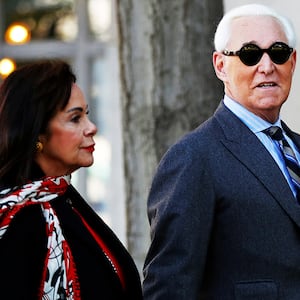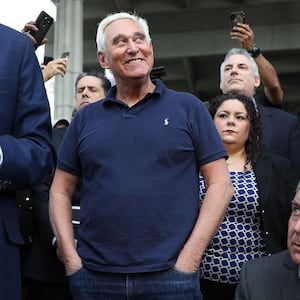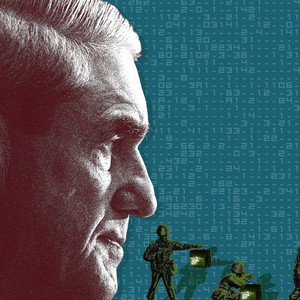All four prosecutors handling Trump ally Roger Stone’s court case withdrew on Tuesday just hours after Department of Justice headquarters stepped in to override their recommended prison sentence and push for a shorter term.
Prosecutors had asked a federal judge on Monday to sentence Stone to seven to nine years in prison. The Republican operative, a longtime Trump confidant and adviser who spent decades pushing Trump to run for president, was convicted of lying to Congress, witness tampering, and obstructing a congressional probe into Russian interference in the 2016 election.
Trump reacted volcanically to news of the recommendation in a tweet sent at 1:48 a.m. on Tuesday, calling it a “horrible and very unfair situation.” And within a few hours, a senior Justice Department official announced that they would override the sentencing recommendation and seek a shorter term. The official told The Daily Beast the department was “shocked” to see the seven to nine year recommendation.
“The Department finds the recommendation, as it was filed, extreme and excessive and grossly disproportionate to Stone’s offenses,” the official said.
The department’s decision to intervene almost immediately after Trump’s angry tweets complaining about the “miscarriage of justice” against his longtime confidant raised concerns about political interference.
Those concerns intensified Tuesday afternoon when prosecutors Aaron Zelinsky, Adam Jed, Jonathan Kravis and Michael Marando filed separate notices advising the judge they were withdrawing immediately as attorneys in the Stone case.
A federal prosecutor, speaking on condition of anonymity, said the apparent involvement of Attorney General Bill Barr in overriding the sentencing recommendation was remarkable.
“We’ve long known that Trump views his political opponents as crooks and his allies as righteous, regardless of the facts or the law. That was plain from his criticism of Jeff Sessions when DOJ indicted two crooked Republican congressmen in 2018; it was plain from his continued support of Manafort up through his conviction. What’s remarkable now is that Barr appears to share that same corrupt view,” the prosecutor said.
A current Justice Department official said it was “not often DOJ leaps to the defense of people who threaten witnesses and judges, and who commit perjury.”
President Trump insisted on Tuesday it was “ridiculous” to suggest he had any involvement in the decision, even while stressing that he could very easily have done so if he had wanted to. “I didn’t speak to the Justice—I would be able to—and I have the absolute right to do it if I wanted to, but I stay out of things to a degree that people wouldn’t believe,” he said.
He said he thought the sentencing recommendation and the “whole prosecution” was “ridiculous” but he wouldn’t talk about a possible commutation of Stone’s sentence yet. “I think it was a disgraceful recommendation and they should be ashamed of themselves,” he added.
In a new sentencing memo filed Tuesday, the Justice Department said Stone’s sentence should be “far less” than seven to nine years but didn’t give a new number. The memo noted that the Justice Department still wanted Stone to be incarcerated but declined to say for how long.
Kerri Kupec, a Justice Department spokesperson, said on Tuesday afternoon that DOJ officials did not consult with the White House regarding their decision to override the initial sentencing recommendation.
She also said the decision was not a response to the president’s tweet, and that Barr was not aware of Trump’s views before the department decided to override the recommendation. That decision was made on Monday night, she said.
A senior DOJ official echoed that statement, saying Trump's tweet had nothing to do with the decision to override the recommendation, and called it “an inconvenient coincidence.” The official also said Tuesday was not an easy day, and that the way the events of the last 24 hours played out was “not ideal.”
Experts were skeptical of the Justice Department’s explanation.
Greg Brower, formerly the FBI’s top liaison to Congress and a former U.S. Attorney for Nevada, called the move “bizarre” and “unprecedented” in his experience.
“The whole story is obviously not known yet, but the AUSAs [Assistant United States Attorneys] who have withdrawn from the case obviously do know the whole story. We need to hear from them,” he told The Daily Beast of the four prosecutors who withdrew.
Paul Rosenzweig, formerly deputy assistant secretary for policy at the Department of Homeland Security, told The Daily Beast the DOJ’s decision should be triggering alarm bells.
“Three years ago, we predicted that Trump’s destruction of norms relating to the rule of law would focus on the Department of Justice. Today that prediction came true. This is an abuse of power so gross as to warrant the gravest concern. Had we not just gone through an impeachment, I would suggest it as an impeachable offense,” he said.
Elie Honig, a former prosecutor in the Southern District of New York, shared Rosenzweig’s concern.
“There are so many things wrong with this that it’s hard to know where to start. Trump’s tweet was wildly inappropriate and undermined his own Justice Department. The Justice Department compounded the damage by reversing itself - which is virtually unheard of. And now the Justice Department doesn’t even have the guts to take a specific stand, but instead contradicts its own career prosecutors while committing to nothing. I have real admiration for the courageous and principled prosecutors who resigned from the case or from DOJ.”
Stone, a self-described dirty trickster whose involvement with Republican Party campaigns goes back to Richard Nixon and Ronald Reagan, was convicted in November. A jury found he lied to, and withheld documents from, House Intelligence Committee investigators about his attempts to learn more about Democratic Party emails hacked by Russia to hurt Hillary Clinton’s presidential campaign. He also tried to pressure a witness, Randy Credico, to do the same. He will be sentenced on Feb. 20.
During Stone’s trial, several former members of Trump’s inner circle testified that they saw Stone as the campaign’s “access point” to WikiLeaks—a connection they hoped would produce more information on the website’s plans to publish hacked DNC emails.
“Roger is an agent provocateur. He’s an expert in the tougher side of politics, when you’re this far behind you’re going to have to use every tool in the tool box,” Steven Bannon, Trump’s former chief strategist, testified.
A jury found that Stone knowingly passed along information to the Trump campaign about the emails, then lied to House investigators about it.
Stone was one of the first people to join Trump’s campaign after he formally announced in June 2015. Although he left just two months later, several former officials testified Stone was still involved behind the scenes. Trump denied knowing anything about communications between Stone and WikiLeaks, a claim that flew in the face of testimony at the trial.

Randy Credico and his dog Bianca arrive at court in September after being subpoenaed by Special Counsel Robert Mueller to testify against Roger Stone.
Drew Angerer/GettyJed and Zelinsky, two prosecutors who worked on Special Counsel Robert Mueller’s probe, signed off on the initial sentencing recommendation for Stone, along with Shea, whom Attorney General Bill Barr named as interim U.S. Attorney for Washington D.C.
Soon after the DOJ’s announcement, Zelinksy withdrew as an attorney and resigned “effective immediately” as a Special Assistant U.S. Attorney for District of Columbia, according to a court filing. He will still work in the U.S. attorney’s office in Baltimore.
Kravis, who previously worked in the White House Counsel’s office under President Barack Obama before returning to Justice and working on some of the cases Mueller’s team brought, told the judge on Tuesday afternoon that he had “resigned as an Assistant United States Attorney” and therefore no longer represented the government.
Jed, another member of Mueller’s team, dropped out later in the afternoon. He signed a court filing that erroneously called him Aaron Jed and said he was leaving the case.







